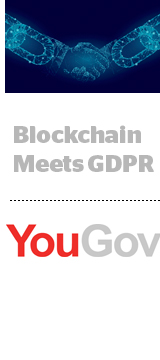
While some ad tech and data companies are shuttering their EU operations in light of the upcoming GDPR, others are investing in new but unproven technologies like blockchain to preserve their data-centric business models.
When GDPR takes effect in about one month, companies with personal data will need to gain explicit consent from EU citizens each time they use that data or sell it to a third party.
Market research company YouGov, which conducts surveys on a panel of six million people around the world, has a burgeoning business in aggregating and selling personal data to ad tech companies and publishers. Because this is the fastest-growing part of YouGov’s business, with margins climbing 50% year on year, figuring out how to keep that function alive under GDPR is critical.
“We use a lot of data for lots of marketing purposes, including as part of the algorithms for serving ads,” said YouGov CEO Stephan Shakespeare. “GDPR makes it essential that, if you want to use this data, you have to get permission.”
GDPR’s strict consent rules require every single instance of personal data use to be sanctified by and transparent to the end user. Under GDPR, it’s no longer sufficient for YouGov to gain blanket consent to sell information – over 5,000 data points about a panelist’s likes, dislikes and media habits over five years – to other companies. It’s also illegal for those companies to use YouGov data without explicit consumer permission.
“The EU information and privacy commissions will come down heavily on companies who do that,” Shakespeare said.
So, to keep its data sales business alive, YouGov is turning to blockchain.
YouGov’s proprietary blockchain solution is designed to alert consumers whenever a third-party uses their personal data. And it records that instance in a public digital ledger.
“The blockchain, being visible and public, shows a receipt for the information used,” Shakespeare said. “That lets people know their permissions are being respected.”
Blockchain can also allow YouGov to automate sending consent notices to each panelist through a personal dashboard they log into to take surveys. In light of GDPR, YouGov built a permissions page into that dashboard where EU citizens can opt in or out of specific uses of their data, including selling that data to third parties.
“Instead of permissions being generalized, they will now be particularized,” Shakespeare said. “There will be more of them, and they will be held in a database that produces notifications all the time.”
To incentivize data sharing, blockchain will allow YouGov to deposit a micropayment in each panelist’s account in exchange for giving consent. These payments, made in digital tokens, can be traded in for a cash check once a panelist accumulates $50 worth of tokens.
“Every single time the data is being used, we are in effect selling it for the purpose of their permission,” Shakespeare said.
YouGov also plans to sell its blockchain solution to publishers, who can use it to gain permission to combine their audience data with YouGov’s panel data, in order to broaden the audience profiles they can sell to advertisers for targeting.
“We add richness to the data that they have,” Shakespeare said. “[With] permission, we can do a lot more interesting things than you can do now [under GDPR].”
YouGov is still testing the blockchain protocol but hopes to have it up and running by mid-summer. While the solution is software-based, the company will work with publishers and ad tech companies under a hybrid tech and services model, Shakespeare said.
“This isn’t a package that you buy and apply and we never hear from you again,” he said. “You have two sets of people using data that’s continuously being added to.”
Tech development isn’t new for YouGov, which has built a proprietary survey platform, database system and analytics platform. But this is the first time the firm is leveraging blockchain.
While the protocol is getting good feedback from clients and users, YouGov won’t know if it’s successful until GDPR takes effect. Shakespeare said he hopes to have all 2,000 of YouGov’s clients using it by the end of the year.
“Anybody who wants to use our data in aggregated forms will have to use this,” he said. “Success will simply be if the thing works.”
Like many companies in the digital advertising industry, GDPR has required YouGov to invest heavily in its own survival. But if other companies can find innovative ways to get consent from users, like YouGov believes it has, the industry could benefit greatly from the regulation, Shakespeare said.
“Under GDPR, the advertiser has skin in the game,” he said. “They can’t just take mass amounts of data and use it to sucker audiences into a higher click rate. They actually have to make this work properly for both sides. Otherwise, it’ll be a failure.”
This post was syndicated from Ad Exchanger.

More Stories
Meta’s Ad Business Is Still Surging As Headcount Ticks Upward
Island Gelato partners with Impact PR
Meta More Than Doubled Revenue From its AI-Powered Ad Tool